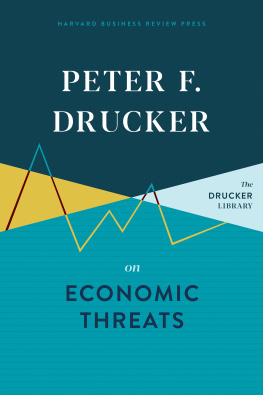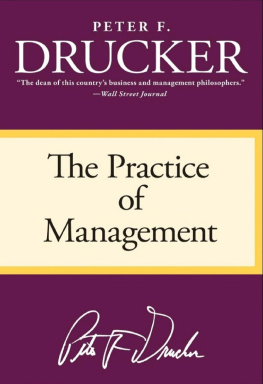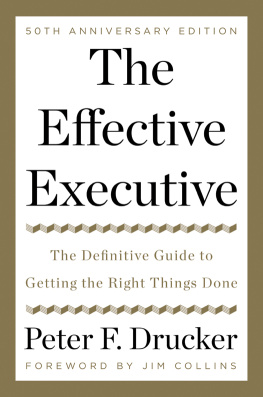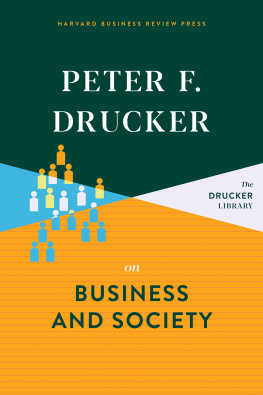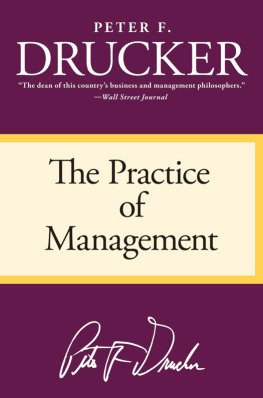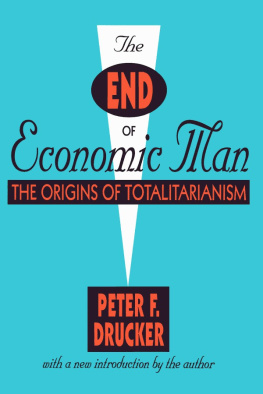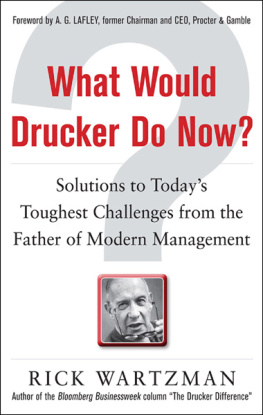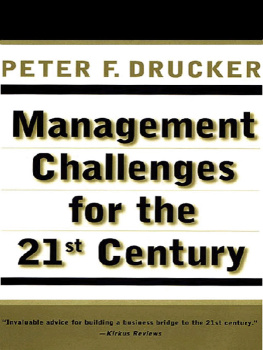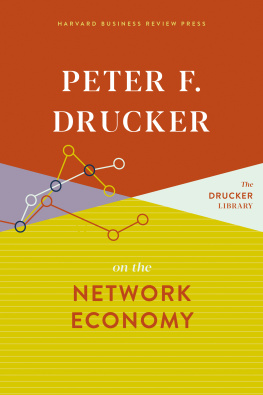THIS BOOK is one of several volumes in the Drucker Library published by Harvard Business Review Press.
The essays in this volume were written between 1975 and 1981. When Peter Drucker collected them for this volume in 1981, he resisted, as he explained in an earlier volume of essays, the temptation to rewrite, contending that it was only fair to let the reader decide how well the authors opinions, prejudices, and predictions have stood the test of time.
Some fifty years later, modern readers may find Druckers language at times dated or inappropriate and some of his arguments controversial or utterly wrongheaded. But as editors we too have chosen to resist the urge to tamper with the original texts, for we did not feel confident we could always tell the difference between updating and censorship. Further, we believe that one of the many delights of these essays for current readers, who enjoy the advantage of complete hindsight extending over the entire period in which Drucker made predictions, is in judging how remarkably prescient and applicable so much of this thinking remains today.
INTRODUCTION: A SOCIETY
OF ORGANIZATIONS
SOCIETY in this century has become a society of organizations. Social tasks which only a century ago were done by the family, in the home, in the shop, or on the farmfrom providing goods and services to education and care of the sick and the elderlyare increasingly performed in and through large organizations. These organizationswhether business enterprises, hospitals, schools, or universitiesare designed for continuity and run by professional managers. Executives have thus become the leadership groups in our society. The leadership groups of oldwhether nobles, priests, landed aristocracy, or business tycoonshave disappeared or become peripheral.
The first job of the executive is to make his organization perform. Results are always on the outside. There are only costs on the inside. Even the most efficient manufacturing plant is still a cost center until a distant customer has paid for its products. The executive thus lives in a constant struggle to keep performance from being overtaken by the concerns of the inside, that is, by bureaucracy. Business at least stands under the control of the market, which forces even the most powerful corporation to subordinate its inside concerns to outside results and to performance. But in the public service institution, where the market test is absentand in many cases cannot even be simulatedbureaucracy constantly threatens to swallow up performance.
For the business enterprise in a market system we are gradually developing a discipline of entrepreneurship, that is, of performance. But even the President of the United States fights a losing battle to preserve his capacity to give political leadership and to make political decisions in the face of the need to manage an unmanageably large, unmanageably complex, and self-centered bureaucratic machine.
The art and discipline of entrepreneurship to make organizations perform and to produce results will therefore be a continuing concern. This concern will involve the public service institution as well as the business enterprise.
The executive as a personas a key individual in society and as a member of his organizationbecomes a matter of increasing importance. Middle managers and other professionals working as individual contributorsas engineers, as chemists, as accountants, as computer programers, as medical technologists, and so onhave constituted the fastest-growing group in American society, and indeed in the society of all developed countries. Careers in organizationsthat is, careers as managers and other professionalsare the principal career opportunities for educated people. Nine out of ten youngsters who receive a college degree can expect to spend all their working lives as managerial or other professional employees of institutions.
Social theorists and political scientists still, by and large, divide the world into bosses and working stiffs. But this was the reality of the nineteenth century. The reality of today consists of people who are bosses but who also have bosses of their own; who are not capitalists but who collectivelythrough their pension funds and their savingsown the economy; people who consider themselves professionals but who are also employees as professionals traditionally were not supposed to be.
Who are they? What do they represent? Where do they stand? What are their problems, their opportunities, their concerns? How can they best use their organizations to achieve their own ends in life and work? And what, in turn, do they owe the organizations that enable them to live comfortable, well-paid, middle-class lives by furnishing the capital they themselves lack and by taking the risks that they could not afford or dare to take themselves?
There are, of course, many other concerns of management and manager: the impact of new technology, labor relations, government regulation, and growing worldwide economic integration; taxation and compensation; rapidly changing internal organization; and the development of managers.
There is the curious ambivalence in our society that shows an apparently hostile face to business and to large organizations but that also favors business schools to the extent that they have become the fastest-growing institutions of higher education. Indeed, the Master of Business Administration degree has become increasingly important for advancement in public service organizations as well as in businesses.
There is the changing age structure of society, which for the young adult is creating a climate of extreme competition. And increasingly, too, there is the desire for a second career for the middle-aged manager and professionala problem for the individual and a challenge to the organization that employs him.

